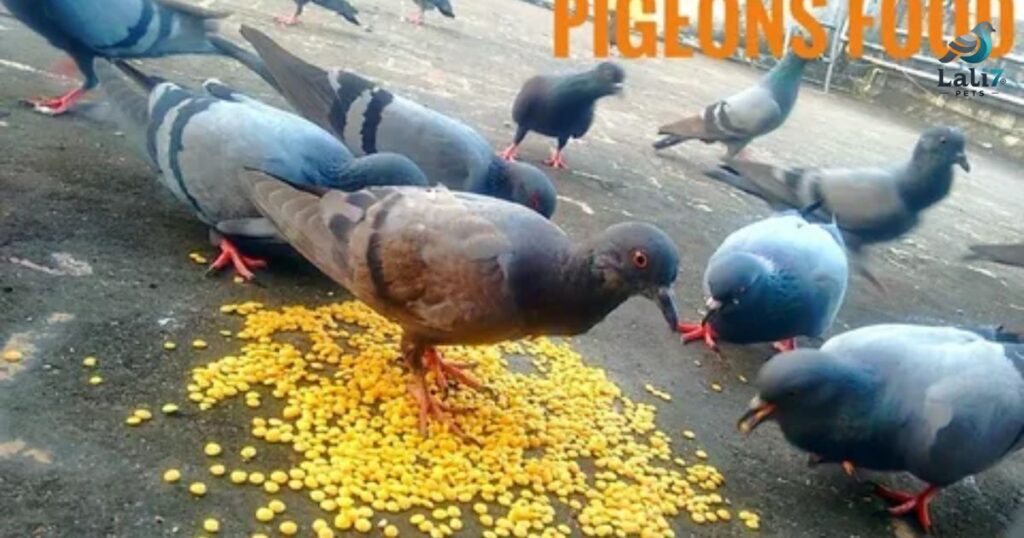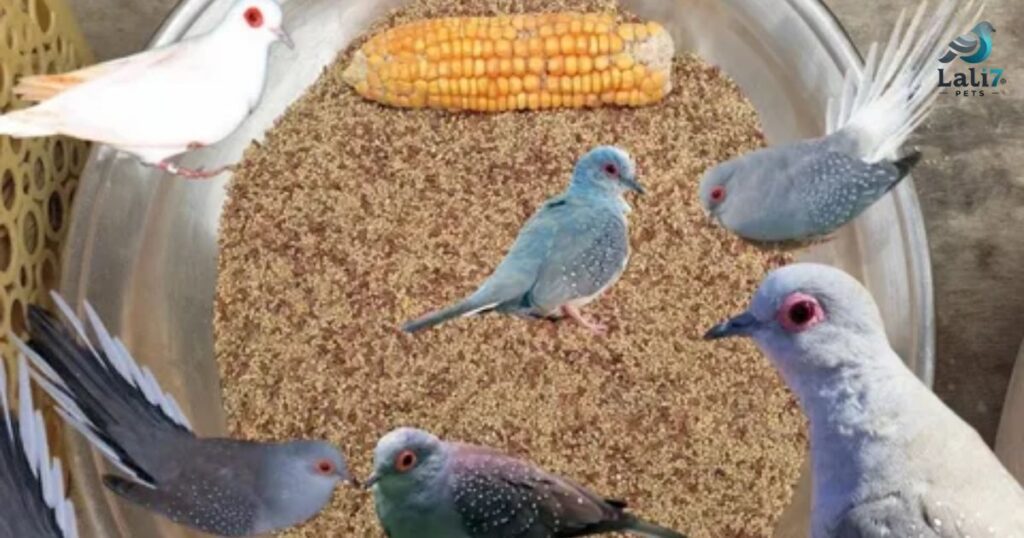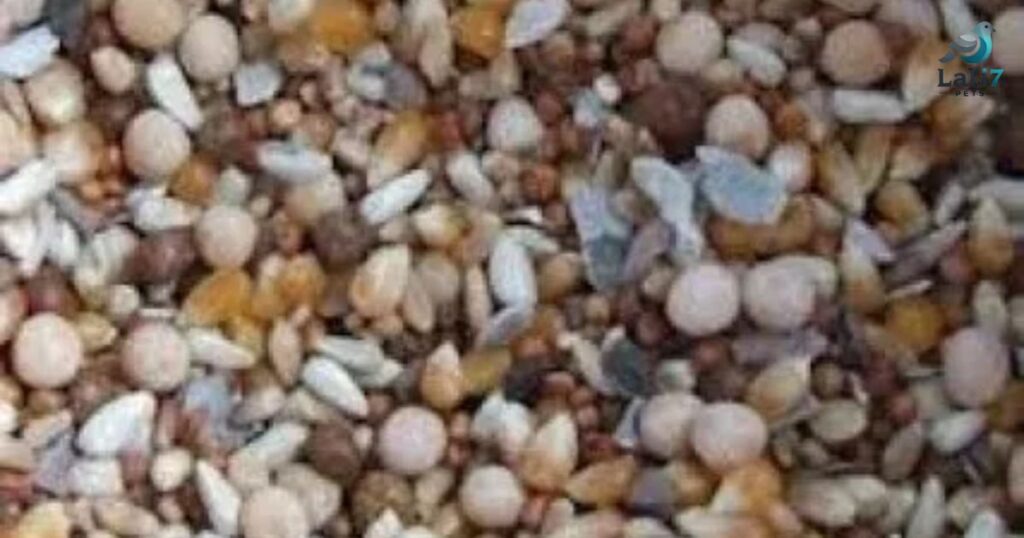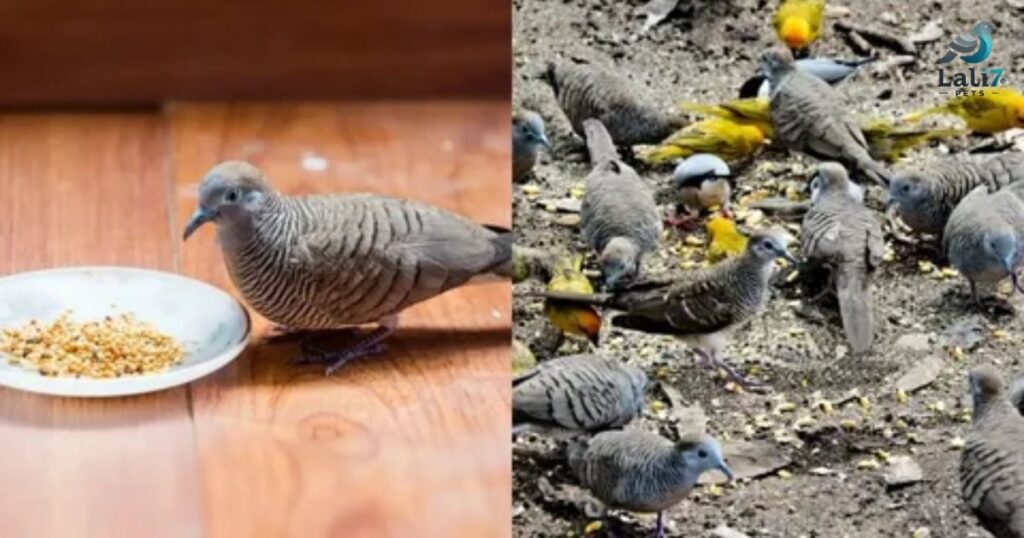Feeding pigeons and doves isn’t just about tossing some grains on the ground—it’s about providing a balanced diet that keeps them healthy, active, and thriving. Whether you are caring for wild pigeons in your backyard, looking after homing pigeons, or keeping doves as pets, knowing the right food for pigeons and doves makes all the difference.
In this guide, we’ll cover the best foods, what to avoid, homemade recipes, and practical tips to help you feed your birds with confidence.
- Why the Right Food for Pigeons and Doves Matters
- Homemade Food for Pigeons and Doves
- Best Food for Pigeons and Doves
- What Not to Feed Pigeons
- What to Feed Pigeons at Home
- Pigeon Food Name List
- What Grains Do Pigeons Eat?
- Seasonal Feeding Tips for Pigeons and Doves
- FAQ on Food for Pigeons and Doves
- Final Thoughts on Food for Pigeons and Doves
Why the Right Food for Pigeons and Doves Matters

Giving pigeons and doves the right food:
- Improves immunity and feather health
- Provides energy for flight, breeding, and growth
- Prevents malnutrition and illnesses
- Builds trust when hand-feeding tame doves
When I first started feeding pigeons in my backyard, I gave them bread and thought I was doing well. Within weeks, one pigeon looked weak and tired. After research, I realized bread is basically empty calories. Switching to a proper diet of seeds and grains completely transformed the flock—they became lively, their feathers shone, and they looked healthier than ever.
Homemade Food for Pigeons and Doves
Preparing homemade food for pigeons and doves allows you to control quality and give them a more natural diet. Here’s a simple step-by-step recipe you can try:
- Choose base grains – Wheat, barley, or corn.
- Add protein sources – Peas, lentils, or safflower seeds.
- Include healthy fats – Flaxseed or sunflower seeds.
- Optional extras – Millet or hemp seed.
- Mix and store in an airtight container.
This mix mimics their natural feeding habits and ensures a balanced ratio of carbohydrates, protein, and fats.
Best Food for Pigeons and Doves
If you don’t want to mix your own, buying commercial food mixes is an excellent option. These are carefully formulated for optimal nutrition. Popular options include:
- Versele-Laga Traditional Pigeon Mix – Used by many racing pigeon keepers.
- Kaytee Supreme Dove Food – Great for pet doves.
- Brown’s Encore Classic Pigeon Food – A trusted blend for homing pigeons.
These ready-made options give peace of mind because you know the nutritional balance is already taken care of.
What Not to Feed Pigeons

Knowing what not to feed pigeons is as important as knowing what to give them. Some foods are unsafe or even toxic:
- Bread & processed foods – Low in nutrients, high in salt.
- Avocado – Contains persin, toxic to birds.
- Chocolate & caffeine – Harmful to the heart and nervous system.
- Onions & garlic – Can damage red blood cells.
- Alcohol & soda – Extremely dangerous.
If you’ve ever seen pigeons gobbling bread in a city square, you might assume it’s harmless. But think of it like feeding children candy every day—it fills their stomach but doesn’t nourish them.
What to Feed Pigeons at Home
If you are caring for pigeons at home, here’s a simple feeding routine you can follow:
- Set up a clean feeding dish – Prevents contamination.
- Provide a grain mix – Wheat, safflower, peas, and millet.
- Always give fresh water – Change at least twice daily.
- Add grit – Grit helps pigeons grind food in their gizzard.
- Offer occasional treats – Peanuts (unsalted) or sunflower seeds.
With consistent feeding, pigeons begin to trust you, and some may even eat from your hand.
Pigeon Food Name List
Here’s a quick pigeon food name list you can keep as a handy reference:
- Wheat
- Corn (cracked or whole)
- Barley
- Oats
- Rice (uncooked, brown preferred)
- Millet
- Safflower seeds
- Peas (split or dried)
- Flaxseed
- Hemp seed
- Sunflower seeds
This list covers all the essentials for a healthy pigeon and dove diet.
What Grains Do Pigeons Eat?

So, what grains do pigeons eat most eagerly? Here are the top favorites:
- Wheat & corn – High-energy grains, especially useful in winter.
- Barley & oats – Good for digestion and keeping weight in check.
- Rice – Light, easy-to-digest grain, best mixed with others.
Interestingly, many pigeons will pick safflower seeds first and ignore corn, just like one bird owner noticed. This proves that variety matters, it prevents picky eating and ensures nutrition.
Seasonal Feeding Tips for Pigeons and Doves
- In winter, Provide more corn and wheat for extra energy.
- In summer – Balance lighter grains like oats and barley.
- During breeding season – Add more protein-rich seeds like peas and lentils.
- Always ensure fresh water and grit are available.
FAQ on Food for Pigeons and Doves
What do pigeons and doves eat?
Pigeons and doves eat a mix of grains, seeds, peas, and small legumes that provide energy, protein, and healthy fats.
Which is the best food for pigeons?
The best food for pigeons is a balanced seed mix of wheat, safflower, peas, corn, and millet, or a trusted commercial pigeon feed.
Can a pigeon eat roti?
Yes, pigeons can eat small pieces of roti occasionally, but it should not replace their main diet as it lacks essential nutrients.
What vegetables can pigeons eat?
Pigeons can eat leafy greens like spinach, lettuce, kale, and dandelion leaves in moderation for added vitamins.
Is it OK to feed pigeons rice?
Yes, uncooked brown or white rice is safe for pigeons in moderation, and it provides them with a good source of carbohydrates.
Final Thoughts on Food for Pigeons and Doves
Feeding pigeons and doves properly is about more than keeping them alive—it’s about helping them thrive. A diet rich in grains, seeds, and nutrients will give them stronger feathers, better immunity, and more energy for flying and breeding.
Whether you prepare homemade food for pigeons and doves or buy a ready-made mix, the important thing is consistency and balance.
So, the next time you fill your feeder, remember: you’re not just feeding birds—you’re investing in their health and happiness.

